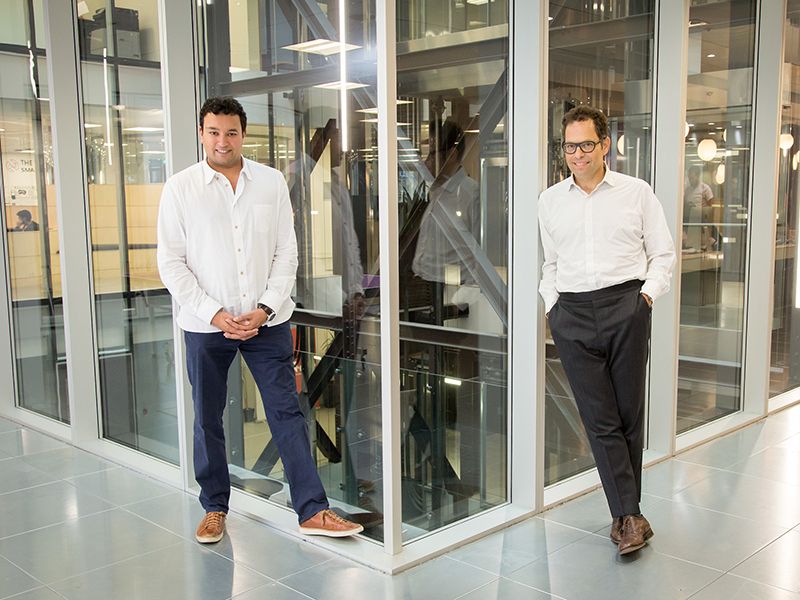Funding Circle Exemplifies the New Wave of Financial Services

On the day of Funding Circle’s IPO, Index Ventures’ partner Neil Rimer shares his reflections about what made the business stand out from the start.
Back in 2014, Funding Circle, the small business loans platform, was set to raise $65 million USD to fuel its growth with a Series D investment. It was the most money the company had ever raised, and Index Ventures was contributing the lion’s share. We’d already led Funding Circle’s Series A round, were its first institutional backer, and remained its biggest shareholder.
A few days before the Series D round was due to close, I got a call from the three founders – Samir, James and Andrew. ‘We’ve noticed that one of our cohort of borrowers is defaulting more than we expected; it’s not huge, but the cohort is moving off the trajectory we’d projected,’ they told me. ‘Until we figure what’s behind it, we’re going to restrict our lending criteria. We wanted to let you know because it’s material, and we understand if you’d like to reconsider your investment.’
The thing about being transparent is that even bad news becomes a kind of good news – a good sign, that is, of a company’s honesty and integrity. As the lead partner for Index, I found this call incredibly heartening. I now think of it as a pivotal moment in Funding Circle’s history. It confirmed my original expectation that even when the stakes were high, the founders would be straight with me. That willingness to self-examine isn’t something I see very often.
I reflected on the data they sent over and called them back a couple of hours later. I told them that I wasn’t worried if they weren’t worried; the data they shared with me was unsettling but but not alarming, given how low their default rates had been in absolute terms and how quickly they were learning from every loan they made and improving their model. We went ahead with the Series D investment-- effectively doubling down on our original investment-- and as it turned out, the spike turned out to be a blip.
Today Funding Circle begins life as a publicly listed company. That’s a massive achievement for the whole team, and it has been a privilege for Index to have been at their side from the start: from the early days when the founders were hammering the phones to manually match borrowers and lenders, to the streamlined platform and processes they have today, which have helped them provide more than £5 billion worth of loans to small businesses.
Funding Circle’s IPO is hugely significant – not just for the company, but for what it says about the maturity of European fintech as a whole-- which is that after a decade of rapid experimentation and growth, the sector has now come of age. It follows the successful listing of Amsterdam-based Adyen and PayPal’s purchase of Stockholm’s iZettle.
We see these transactions as some of the first major market validations of a new breed of businesses that sprang up in the wake of the financial crisis. Remember, back then, how the worst of big banking had been laid bare: the fact that certain storied institutions had venerable names, landmark buildings and big balance sheets didn’t really mean a lot, in the end. None of that prevented them from finding legal loopholes, abusing people’s trust and taking risks they shouldn’t have taken. Traditional financial services had become about squirrelling away the biggest possible margin from the end user. But after 2008, customers finally saw through it all and they had had enough.
Entrepreneurs recognized the importance of these developments and seized upon the opportunity to offer an alternative. Everything was up for grabs – lending, insurance, asset management, payments and more. These startups made a fresh pact with consumers: to use technology, transparency and simplicity to give users a better deal. ‘Here’s my business model and here’s what I make from it,’ they declared. ‘I’ll take a part of it, and the rest I’ll pass onto you as a saving.’
Openness, then, is a defining feature of this cohort of fintech businesses. At Funding Circle, that principle is enshrined as an explicit company value. It operates at the level of the team’s culture, with the unprecedented amount of information that’s passed on to lenders, investors and staff. It also applies to how much Funding Circle understands about its customers and markets. Recall that one of the major problems for the big banks during meltdown of 2008 was that they couldn’t get a decent picture of their own risk profile. By contrast, the clever way that Funding Circle uses data gives them a very clear, rich understanding of the kinds of businesses they’re lending to, as well as the connectedness of various financial markets. They know exactly where investors’ money is going: lending with Funding Circle is not a black box. In this day and age, that’s becoming table stakes.
Something else that stood out about Funding Circle – and epitomises its generation of fintech businesses – was the strength of the founders’ mission. Rather than be myopically focused on profit, it was clear they were driven by a bigger vision: to become the first choice for small business loans worldwide. SMEs are the lungs of any growing economy, but they’re woefully underserved by traditional finance. Samir, James and Andrew believed it didn’t have to be that way, and that small businesses should be able to borrow quickly and efficiently. They also figured that investors could earn great returns by putting their money to a good use and supporting local businesses. And the potential is huge: just in the four countries in which Funding Circle now operates – the UK, the US, Germany and the Netherlands – the total market for small business lending is estimated to be £1.2 trillion-- that’s trillion with a T.
A third virtue of the new fintech paradigm is its careful, responsible attitude to regulation. Funding Circle has had to negotiate considerable regulatory complexity in order to expand to multiple markets. But instead of trying to sidestep various laws and rules, the company actively welcomes nuanced regulation. They work cooperatively with the authorities to help create new standards for the innovative services they’re providing. And increasingly, instead of slapping on old norms, enlightened regulators around the world are recognising that companies like Funding Circle are doing great work, providing consumers, businesses and investors with something that’s been lacking.
Of course, some errors are inevitable in a fast-growing business. All great entrepreneurs have to be really stubborn and bullheaded and barrel forward, because every day people are telling them that what they’re doing can’t be done. But it’s unusual to get people with the self-awareness to grasp when they need to seek outside advice, so they can avoid making a mistake that could be fatal. Doing that too often makes you indecisive, but not doing it enough means you screw up more than you need to. Samir and his leadership team do it just enough.
Few businesses can be multi-billion dollar enterprises by winning a small fraction of their addressable market. Funding Circle is one of them. Perhaps the most exciting thing about the team is that, despite their achievements to date, they’ve got greater ambitions in their sights. Index Ventures and I are incredibly proud to be supporting Funding Circle as it begins the next phase of its journey towards building a more transparent and more inclusive financial world.
Published — Sept. 28, 2018
-

-
